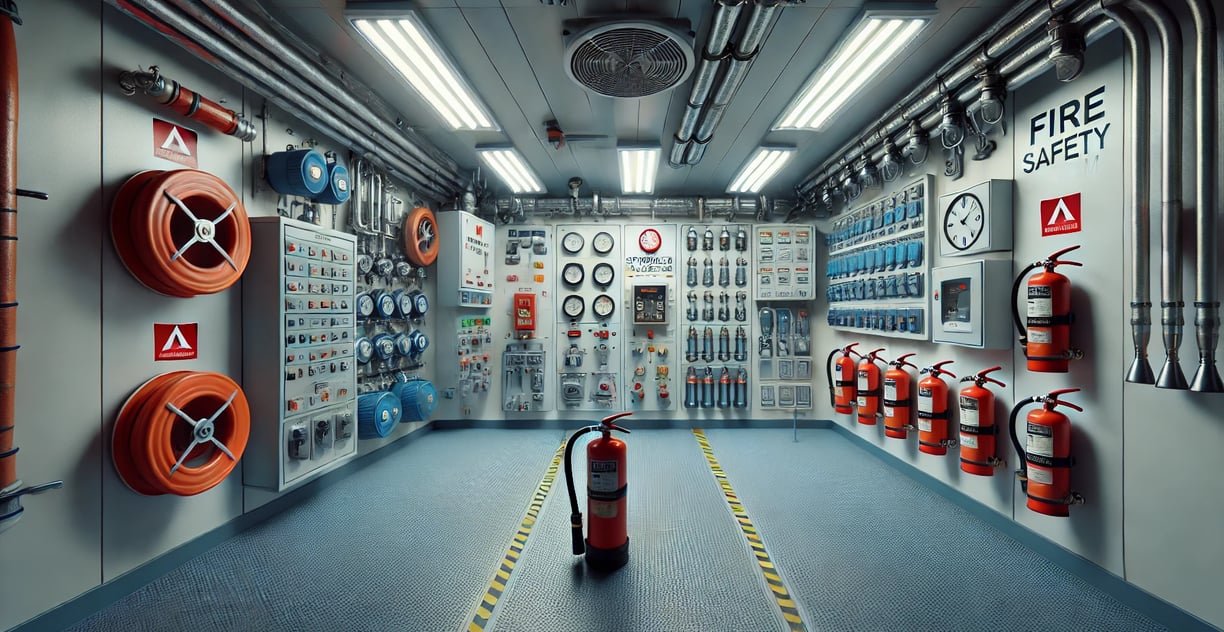The Importance of Quality Standards in Maritime Safety
11/17/20244 min read


Introduction to Quality Standards in the Maritime Industry
Quality standards in maritime safety are guidelines and criteria developed to ensure that operations in the maritime environment are carried out safely, efficiently, and in compliance with established regulations. These standards cover various aspects of the industry, including vessel construction, port management, and maintaining safety during navigation. In a sector where risks are inherently high, implementing quality standards is essential to prevent accidents and protect both people and the environment.
The relevance of these standards in the maritime industry cannot be underestimated. By establishing clear regulations and operational procedures, a culture of safety is promoted, which is vital for trust in maritime activities. Vessels and ports that comply with these standards are less likely to experience incidents, positively impacting the industry as a whole. This benefits not only the companies involved but also strengthens public perception of maritime safety, which is critical for the growth of tourism and trade.
Organizations that establish these standards are diverse, including national and international entities such as the International Maritime Organization (IMO), the Baltic and International Maritime Council (BIMCO), and maritime administrations of individual countries. These organizations are responsible for developing and regularly updating quality standards to keep them relevant in addressing the new challenges of modern navigation.
Failure to comply with these standards can have severe consequences, ranging from fines and sanctions to the loss of operational licenses and, in more extreme cases, irreparable harm to human lives and the natural environment. For these reasons, it is crucial that all maritime industry stakeholders recognize and adhere to established quality standards, ensuring safer seas for everyone.
The Impact of Quality Standards on Vessel and Port Protection
Implementing quality standards in maritime safety is crucial for protecting both vessels and ports. These standards not only regulate the design and construction of ships but also ensure proper maintenance practices are followed. By establishing clear criteria, risks associated with navigation are significantly reduced.
In terms of vessel design, quality standards require consideration of critical factors such as stability, corrosion resistance, and load capacity. These elements are essential to ensure that vessels can withstand adverse conditions at sea. For example, a design that fails to meet these standards could result in structural failures, endangering not only the lives of those onboard but also the marine environment in case of a shipwreck.
Construction methods also play a crucial role. Using high-quality materials and certified construction techniques allows vessels to have a longer lifespan and better performance. A notable example is an incident where several ships sank in a port due to construction defects; this could have been avoided if rigorous quality standards had been followed. Furthermore, proper maintenance, including regular safety checks and necessary repairs, is another vital aspect derived from the implementation of these standards, ensuring the safe operation of vessels over time.
In summary, quality standards are indispensable for safeguarding vessels and ports. Their adoption not only enhances safety but also helps prevent incidents that could have severe repercussions.
Risk Prevention Through Quality Standards
Quality standards play a fundamental role in risk prevention within the maritime environment. In this sector, where operations are subject to various adverse conditions, implementing these standards becomes a key tool for safeguarding the safety of vessels and their crews. One of the main risks faced by seafarers is adverse weather conditions, which can arise suddenly and jeopardize vessel stability. By adopting standards that regulate navigation procedures and route planning, the likelihood of weather-related accidents is significantly minimized.
In addition to weather conditions, equipment failures represent another significant risk. The quality of materials and technical maintenance are critical for safe operations. Implementing quality standards in the design and construction of vessels ensures robust and reliable structures. Likewise, rigorous, scheduled maintenance adhering to established standards prevents small failures from escalating into major issues during a voyage.
Crew training is also essential in mitigating risks at sea. Crew members must be trained not only in the proper use of technology and equipment but also in managing emergency situations that may arise. Integrating quality standards into these training programs improves incident response, strengthening the discipline and operational capacity of the crew. Therefore, it is clear that quality standards are vital for preventing risks in the maritime environment, ensuring both the safe operation of vessels and the protection of their occupants.
Compliance with International Regulations and Its Importance
Compliance with international regulations is essential for ensuring safety and efficiency in the maritime industry. These regulations, which cover everything from vessel construction to operational practices, are designed to protect not only users but also the environment. Key regulations include the International Ship and Port Facility Security Code (ISPS) and the International Convention on Standards of Training, Certification, and Watchkeeping for Seafarers (STCW). Both have evolved significantly over the years to address new threats and challenges in the maritime field.
Implementing and adhering to these regulations contribute to creating a safer maritime environment by reducing the risk of accidents and improving emergency response. Additionally, quality standards allow maritime sector companies to not only meet legal requirements but also demonstrate their commitment to safety. This is especially relevant at a time when public perception of maritime safety is a critical factor in attracting users and fostering confidence in maritime operations.
Moreover, adhering to international standards can significantly enhance the global reputation of the maritime industry. Companies that comply with recognized standards position themselves as leaders in responsibility and professionalism, giving them a competitive edge in the market. The trust generated by adhering to these international guidelines is a vital component for the sustainable growth and reputation of the industry, as customers and stakeholders increasingly value safety and a commitment to best practices.
© 2024. All rights reserved.
Contact us
+34 871 559 095
email: info@safenautic.com
Locations
Technical center
Av de la Mediterranea nº 1
46600 Alzira, Valencia
Strategic and Commercial Development Office
Paseo Mallorca 14
07012 Palma de Mallorca
